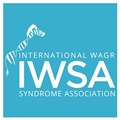Story
What started as a challenge to complete a triathlon has evolved into something far more worthwhile: to raise awareness and funds for WAGR, which is where a deletion of a chromosomes during early pregnancy, leading to a range of complications in new born babies. Lizzie & Matt Pullen's baby George was born with this condition 2 years ago which has turned their world upside down.
Please read Lizzie & Matt Pullen's story...
George was diagnosed with an ultra rare genetic condition at 4 weeks old called WAGR syndrome. Health professionals believe there to only be around 500 cases in the world of WAGR syndrome making him an extremely special little boy. George is registered blind, has already had 3 major surgeries under the care of Great Ormand Street Hospital, and has cataracts that have developed in his eyes that continue to grow bigger and bigger each month obscuring the little vision he has. George walks on his tip toes as requires deep pressure to help him cope with his sensory processing disorder. He has to wear dark sunglasses just to go outside as he is extremely light sensitive due to having
no iris in his eyes. He has to have 3 monthly renal scans to look for tumours in his kidneys as 60% of WAGR children will develop Wilms tumour by age 6, the most common age is 2. George cannot self regulate and finds many aspects of day to day life a challenge .... yet despite all this, he remains the happy, resilient and content child he has been since the day he came in to our lives.
WAGR is an acronym for the 4 main characteristics of the syndrome, these are W – Wilms tumour of the kidneys, A – Anaridia (absence of the iris in the eye), G – Genitourinary abnormalities, R – Range of developmental delays. Children with WAGR syndrome require heavy intervention from medical professionals throughout their lives and have to attend a multitude of appointments each month to see the likes of ophthalmologists, sonographers, physiotherapists, speech and language therapists, occupational therapists, paediatricians, urologists, geneticists and vision teachers to name but a few.
The diagnosis of WAGR syndrome when it is your child comes with a whole range of emotions – shock and disbelief, anger, sorrow, guilt and fear of the unknown, especially when you are told it is a 1 in 1 million odds to happen to your child. My husband and I went through an extremely hard time accepting what had happened to George since nothing flagged up in my pregnancy, and this was exacerbated by the fact that the syndrome is so rare and there was little information available to us, along with next to no support.
We then found www.WAGR.org, a website run and maintained by parents of children with WAGR syndrome. This changed our lives and put us in contact with families all over the world dealing with the same challenges and range of emotions we were going through. We even found 2 families living within an hour’s drive to us who had children
with WAGR!
The mission of the IWSA (international WAGR syndrome association) is to promote international knowledge and awareness of WAGR syndrome and its complications and treatments, to stimulate research and to reach out to those affected by WAGR syndrome in an effort to improve their lives. As a non profit organisation, they rely heavily on donations to continue the amazing work they do for our families. Most recently, money has been utilised to create and manage a database holding medical information on each of our children, documenting their continued health issues and challenges to better understand the more common issues associated with the syndrome. In turn this will allow researchers to produce more realistic statistics outlining the more common traits of the syndrome which we hope will better support our WAGR children and lead to faster intervention for some of the issues as we will have statistical data to prove this.
Thank you for taking the time to read this and for supporting our charity, it means so much to all the families and myself. Good luck Nousheh and thank you!
